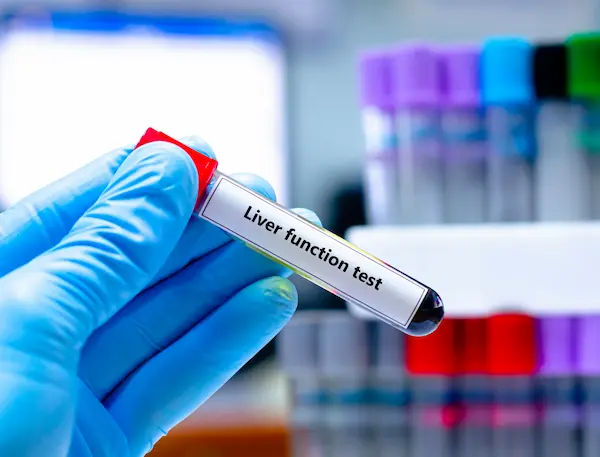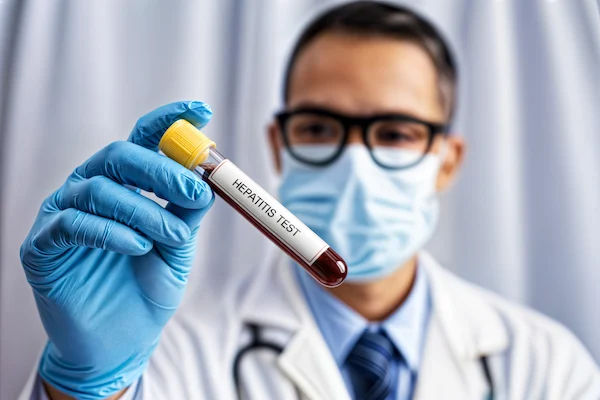Liver Function Test
Understand the Liver Function Test (LFT): learn about its procedure, what the results mean for your health, and typical costs in India. Get insights into this crucial blood test for liver health.

Written by
Last updated on 14th Jul, 2025

Liver Function Test: Price, Procedure, and What Results Mean
If your doctor has suggested a Liver Function Test, you might be wondering what it involves and why it matters. This simple blood test offers a detailed look at how well your liver is working by measuring key enzymes and proteins in your blood. Whether you're managing a known liver condition, checking for side effects of medication, or just staying on top of your health, understanding the cost, procedure, and meaning of the results can help you feel more informed and in control. In this guide, we will explore the purpose of the Liver Function Test, what to expect during the procedure, the cost of the test, how to prepare, and how to understand your results so you can make informed decisions about your health.
What the Liver Function Test (LFT) Reveals About Your Liver Health
The Liver Function Test (LFT) is a group of blood tests that help evaluate how well your liver is working. Rather than focusing on a single result, this panel measures several enzymes, proteins, and substances that reflect liver activity and potential damage.
Doctors use LFTs to:
- Detect liver problems, such as inflammation, infection, or damage
- Monitor ongoing liver conditions, including hepatitis or fatty liver disease
- Check for side effects from medications that may affect the liver
- Investigate symptoms like jaundice, fatigue, or abdominal pain
Your liver plays a central role in keeping your body healthy. It filters toxins, produces bile for digestion, stores energy, and helps with blood clotting and immune function. When the liver is under stress or not functioning properly, these processes can be disrupted. LFTs help identify these changes early, often before symptoms become severe.
Understanding your LFT results can give you and your doctor valuable insight into your liver’s condition and guide the next steps in your care.
When Should You Get a Liver Function Test?
Your doctor might recommend an LFT for various reasons, whether you have symptoms or as part of a routine check-up.
You might need an LFT if you have symptoms like:
- Yellowing of your skin or eyes (jaundice)
- Dark urine or pale stools
- Nausea, vomiting, or loss of appetite
- Unexplained fatigue
- Abdominal pain or swelling, especially in the upper right side
- Itchy skin
- Easy bruising or bleeding
You might also need an LFT if you have risk factors such as:
- Regular alcohol consumption
- Family history of liver disease
- Exposure to hepatitis viruses
- Taking medications that can affect the liver
- Obesity or diabetes (which increases the risk for fatty liver disease)
- As part of a routine physical examination or full body checkup
Key Aspects of the Liver Function Test: Procedure, Preparation, and Results
Understanding the practical details of the Liver Function Test can help you feel more prepared and confident.
1. Procedure: A Simple Blood Draw
- The Liver Function Test is a routine blood test. A healthcare professional will draw a small sample of blood, usually from a vein in your arm. The process is quick and generally takes only a few minutes. You might experience a brief sting or discomfort.
2.Preparation: Follow Your Doctor's Instructions
- For some LFT components, your doctor may ask you to fast (not eat or drink anything except water) for 10-12 hours before the test. This is often required to ensure accurate readings for certain substances, like bilirubin or ALP, which can be affected by food intake.
- Always follow your doctor's specific instructions regarding fasting and any medications you are taking, as some drugs can influence liver test results.
3. Interpreting Your Results: Your LFT results will show numerical values for several different components. Your doctor will interpret these numbers together, along with your symptoms, medical history, and other relevant tests, to get a complete picture of your liver health. Here's a look at the common markers:
- ALT (Alanine Transaminase)
- What it measures: ALT is an enzyme found mostly in liver cells.
- What results mean: High ALT levels usually mean there is inflammation or damage to the liver cells. It's often considered a more specific indicator of liver injury than AST. Common reasons for elevation include fatty liver disease, viral hepatitis, or medication side effects.
2. AST (Aspartate Transaminase)
- What it measures: AST is another enzyme found in liver cells, but also in other organs like the heart and muscles.
- What results mean: Elevated AST levels also suggest liver cell damage, similar to ALT. However, since AST is found in other organs, high levels might sometimes indicate damage to other parts of the body as well, not just the liver. When both ALT and AST are high, it strongly points to liver inflammation or injury.
3. Bilirubin Levels (Total and Direct)
- What it measures: Bilirubin is a yellow pigment produced when old red blood cells break down. The liver processes bilirubin and excretes it into bile. The test measures the total amount of bilirubin and specific types (direct/conjugated and indirect/unconjugated).
- What results mean: High bilirubin levels cause jaundice (yellow skin/eyes) and dark urine. Elevated direct (conjugated) bilirubin specifically suggests that the liver is not properly processing and excreting bilirubin, often due to liver cell damage or a blockage in the bile ducts. High indirect (unconjugated) bilirubin can point to issues with red blood cell breakdown or certain liver problems.
4. ALP (Alkaline Phosphatase)
- What it measures: ALP is an enzyme found in the liver, bile ducts, and bones.
- What results mean: Elevated ALP levels, especially when seen with high bilirubin, often suggest a problem with the bile ducts (the small tubes that drain bile from the liver). This could be due to blockages from gallstones, inflammation (cholangitis), or certain liver diseases. High ALP can also be due to bone conditions.
5. Albumin
- What it measures: Albumin is a major protein produced by the liver. It helps keep fluid within your blood vessels and carries various substances.
- What results mean: Low albumin levels can indicate that the liver is not functioning well enough to produce adequate amounts of this essential protein, often seen in chronic (long-term) liver disease or severe malnutrition. Low albumin can contribute to swelling in the legs and abdomen.
6. Prothrombin Time (PT) / International Normalised Ratio (INR)
- What they measure: These tests assess how quickly your blood clots. Clotting factors are proteins primarily made by the liver.
- What results mean: If the liver is severely damaged, it may not produce enough clotting factors, leading to a prolonged PT/INR. This indicates a serious impairment of the liver's ability to synthesise these proteins and reflects its overall function.
Your Liver Function Test results, along with your symptoms, medical history, and any other relevant tests or imaging, will help your doctor accurately assess your liver health. This comprehensive understanding enables your doctor to develop a targeted plan to protect your liver.
If your doctor recommends a Liver Function Test (LFT) to check your liver health, choosing a reliable and convenient testing service is important. Apollo 24|7 makes this simple by providing accurate lab tests with quick results. This helps you and your doctor understand your liver’s condition clearly and create a personalised plan to manage your health.
Why Choose Apollo 24|7 for Your Liver Function Test?
- Comprehensive Test Panels: Access complete Liver Function Test panels that cover all essential markers for a thorough assessment.
- NABL-Accredited Labs: Tests are done in labs certified by the National Accreditation Board for Testing and Calibration Laboratories (NABL), ensuring accurate and trustworthy results.
- Home Sample Collection: Enjoy the convenience of blood sample collection at your home, saving you time and providing privacy.
- Easy Online Booking: Schedule your test quickly and easily through the Apollo 24|7 app or website.
- Fast Digital Reports: Receive secure, detailed test reports online promptly, ready to share with your doctor.
- Trusted Brand: Benefit from the trusted expertise and healthcare legacy of Apollo Hospitals Group, one of India’s most respected medical networks.
By choosing Apollo 24|7, you get access to dependable, convenient diagnostic services that make it easier to understand and manage your liver health effectively.
For the most accurate and current LFT Test price, it is best to check the Apollo 24|7 website, use their mobile app, or contact their customer support team directly. Pricing may vary based on your location, available offers, or membership benefits.
Get These Tests To Get A Yourself Checked up
Conclusion
The Liver Function Test (LFT) is a powerful diagnostic tool for anyone concerned about their liver health. It provides a comprehensive look at how well this vital organ is performing, helping to detect damage, monitor conditions, and guide treatment.
Understanding the simple procedure, preparing appropriately (including any necessary fasting), and interpreting your results accurately are vital steps in proactive health management. This test empowers you and your doctor to make informed decisions for protecting your liver and maintaining your overall well-being. If you have symptoms or risk factors for liver issues, consult your doctor to discuss when and how often you should take an LFT to take control of your health.





